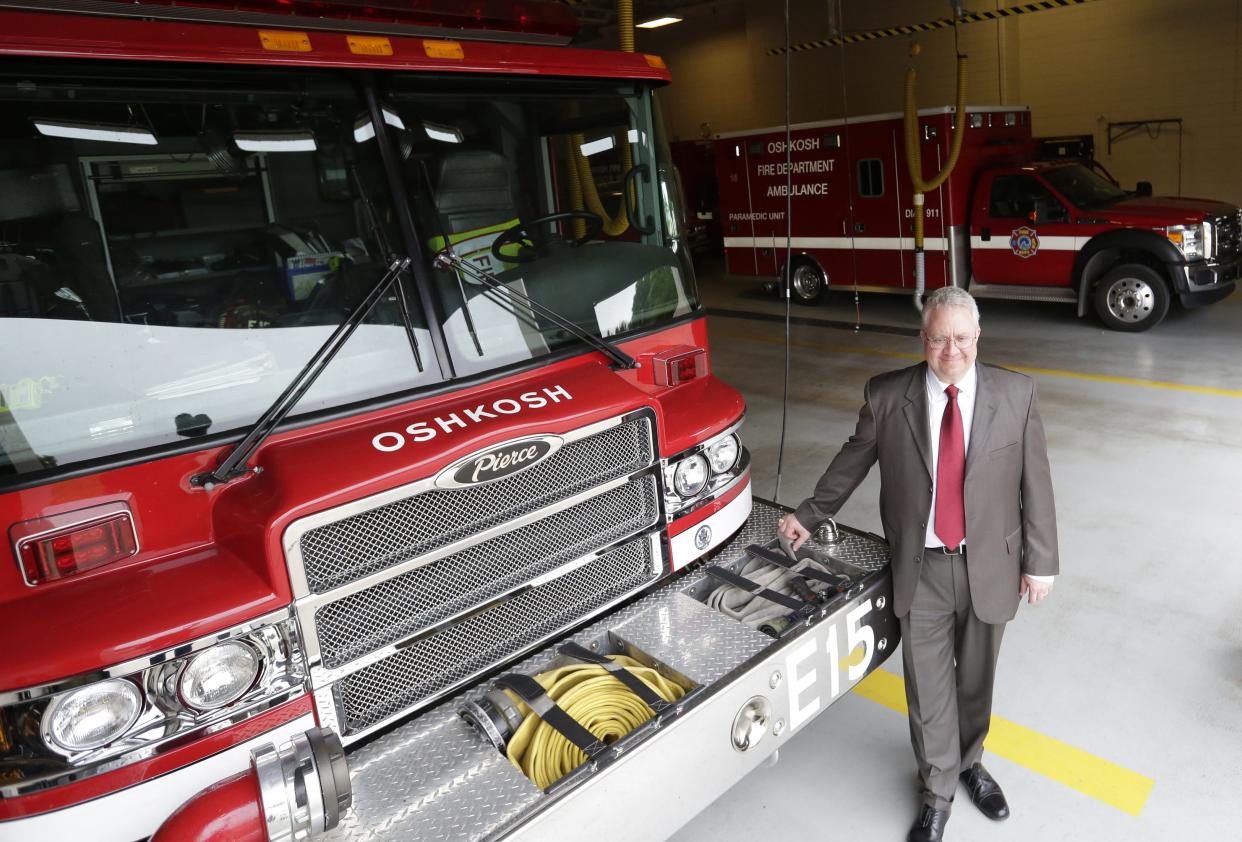2 new bills want to change 'no lift' policies for residents who fall at elderly care facilities

OSHKOSH - Two new bills could implement lifting devices and fall prevention and recovery programs in nursing homes and assisted living facilities in Wisconsin.
Led by Oshkosh-area public safety officials and lawmakers, the initiative to improve fall recovery in the state could improve Wisconsin's ranking as the No. 1 state in the number of falls and fall-related deaths. Falls are on the rise statewide among residents 60 and older.
Firefighters and emergency medical technicians regularly respond to "lift assists" in senior living facilities to help residents get back up, though they weren't injured and don't need to be taken to a hospital. Nursing homes and assisted living facilities often have "no lift" or "no touch" policies in Wisconsin that prevent the employees at the facilities from touching clients after a fall and possibly hurting them. The policies require the facilities to call 911 and wait instead.
The two bills would allow staff to help residents up instead of calling 911. State Rep. Lori Palmeri, D-Oshkosh, authored the bills. If they're approved, they would also create a statewide requirement for CPR training in assisted living facilities and ease some of the workload on understaffed emergency responders.
Falls in senior living facilities are on the rise; 'no lift' policies require residents to wait for help
When Mike Stanley was sworn in as Oshkosh's new fire chief in 2018, he went through the fire department's calls and noticed most of them were related to falls. On average, 20% of calls were coming for fallen residents, compared to car wrecks, fires and other accidents. A bulk of those fall-related accidents were for residents who weren't hurt.
It's an increasing trend statewide, according to a report released in September by the state Department of Health Services. Since 2019, emergency medical services are responding to more falls each year, according to the report.
2019: EMS responded to 105,855 falls.
2020: 109,675 falls
2021: 120,035 falls
2022: 130,910 falls
The 130,910 falls that EMS responded to in 2022 accounted for 18% of 911-related ambulance runs that year.
Nearly 17,000 falls were inside nursing homes in 2022, the report shows. The number of residents who fell in nursing homes rose on average 8.6% each year since 2019. Falls in assisted living facilities were not categorized.
The "no lift" policies are tying up emergency medical responders' time and resources, at a time when EMS agencies are facing a severe strain of funding and staffing statewide.
Stanley said many times families don't know the policies are in effect at the facility they moved their loved ones into.
He hopes that by creating fall prevention and recovery programs under the bills, the responsibility of care will go back to staff and residents and reduce some of the stress on emergency responders. Training inside the facilities would also reduce the chance of residents hurting themselves.
"They just need to know how to fall and how to get back up," Stanley said. "Maybe they don't need anyone to assist them."
Bills require CPR training at assisted, independent living
Assembly Bills 942 and 943 are a continuation of fall prevention efforts Stanley previously worked on with Palmeri when she was mayor in Oshkosh before she was elected to the state Assembly.
"It's not only impacting public safety, it's affecting the health care system, causing financial burdens with families," Stanley said. "It's about preserving people's health."
Assembly Bill 942 would create a "duty of care" in assisted living and nursing homes, Palmeri said. DHS would create new fall prevention and recovery programs for both the residents and employees, to go into effect just over a year after becoming law.
The new programs would involve a "significant overhaul" of DHS regulations related to senior care, Palmeri said.

The bill also adds a statewide requirement for CPR training in assisted living.
While nursing homes are required to train staff in CPR, employees at community-based residential facilities — a type of assisted living in Wisconsin — do not have the same mandate. DHS requires first aid and choking training for certain employees at the facility, but it's up to the owners of the facilities if they want to include CPR in that training.
Under Bill 942, all types of senior care facilities would need to have at least one employee available who is trained to perform CPR, first aid, and fall recovery at all times. The employees would also be required to use lifesaving measures including CPR before emergency responders arrive.
Similar to "no touch" policies, more senior living providers are implementing corporate policies that prohibit employees from performing CPR before paramedics arrive, Stanley said The proposed bill would preclude administrators from developing those policies because performing CPR right away "increases the person’s survivability immensely," Stanley said.
Companion bill 943 would create a pilot program to implement 100 electric lift devices into senior care facilities statewide. The pilot program costs $300,000 under the bill, including $100,000 to develop surveys and data to understand the efficacy of lift devices.
The bills were modeled partly after a similar one in Arizona that was signed into law in 2021, in response to the state's own "no touch" policies.
Palmeri hopes there will be significant progress for the bills in the current legislative session.
"We need to continue to invest in prevention programs but in the case that prevention doesn't work, that also needs to be addressed," Palmeri said.
The bills will receive a public hearing Wednesday in the Assembly with the Health, Aging, and Long-term Care Committee.
A fall 'epidemic': Know your fall risk
One in four people aged 65 and older falls each year, according to the Centers for Disease Control and Prevention. Wisconsin has the highest rate of injury-related deaths among older adults due to falls at 176.5 per 100,000, based on CDC data.
While some may say it's due to the icy weather, Stanley said local numbers show people are mostly falling inside their homes by tripping on the rug or having a lot of clutter on the floor. With the state's aging population, falling has become a critical issue to address inside and outside senior care facilities.
"Look at it as an epidemic," Stanley said.
Created by the Wisconsin Institute for Healthy Aging, the Free Falls Wisconsin Coalition put together resources on preventing falls including strength and balance exercises and footwear tips. A home safety challenge takes you through the common hazards in your home.
FFWI provides information on the National Council on Aging’s Falls Free Check Up in English and Spanish to learn if you're at risk of hurtful falls.
More: A guide to finding a senior care facility in Wisconsin
More: Wisconsin Senate passes bill that would give elderly more time to find new facility if evicted
Benita Mathew is a health reporter for the USA TODAY NETWORK-Wisconsin. Contact her at bmathew@gannett.com.
This article originally appeared on Green Bay Press-Gazette: 2 bills target fall prevention, recovery at facilities for elderly

